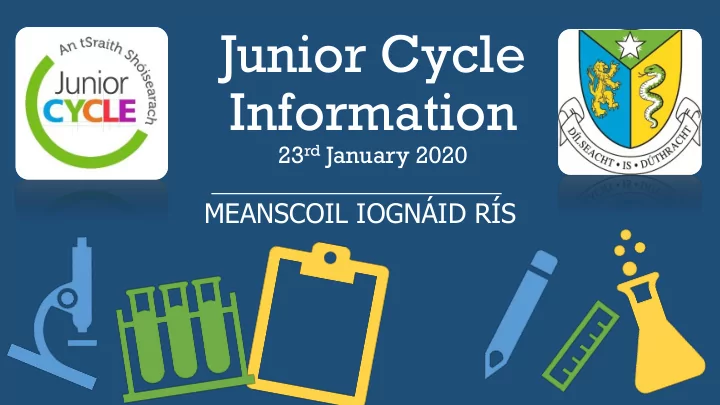

Junior Cycle Information 23 rd January 2020 MEANSCOIL IOGNÁID RÍS
New Junior Cycle – New Language Document available on our school website www.naascbs.ie under JCT - > JCT New language • 1. Classroom Based Assessment (CBA) /Schedule • 2. Assessment Tasks (AT) • 3. Reporting • 4. Junior Cycle Profile of Achievement (JCPA) • 5. Wellbeing
Key changes in in the New Junior Cycle
Presentation Active Learning Research Group work Pair and Share
Your child in in Fir irst-year September 2019 Sept Sept Sept Sept Sept 2016 2017 2018 2019 2020 English English English English Science Science Science Science Business Business Business Business Irish All subjects are Irish Irish Visual Art now part of the Visual Art Languages Visual Art New Junior Cycle Maths Programme Modern Languages History Languages Maths Geography History Music Geography Wellbeing Graphics Music Wood Technology Religion Wellbeing Wellbeing
Assessment – What does this is lo look li like for our students? Traditional Assessment System New Junior Cycle Assessment • Christmas exams & Summer exams • Christmas exams & Summer exams • Class Tests (End of chapter/topic) • Class Tests (End of chapter/topic) • Practical Exams e.g. Music, Art, MTW, TG • Practical Exams e.g. Music, MTW, TG • Classroom Based Assessments (CBAs) • Oral Exams • Assessment Tasks • Junior Certificate Exam • Junior Cycle Exam
Classroom Based Assessments • CBAs provide an opportunity for independent learning. • Students will undertake two classroom based assessments in each subject, one in second year and one in third (exception Gaeilge). These are facilitated by the teacher. The type of assessment will vary for each subject. • CBAs allow students to demonstrate their understanding of concepts and skills and give students an opportunity to perform in ways that may not be possible in an externally assessed examination. • CBAs will be assessed by the teacher using JCT Features of Quality and reported to students and parents/guardians during junior cycle and in the JCPA .
nd Year Schedule CBA 2 nd
Reflection Poster
Changes to Reporting nd Year Reports ill be on 2 nd Both grading systems wil Traditional Grading System New Junior Cycle Grading System A 85 to 100% Distinction 90 to 100% B 70 to 84% Higher Merit 75 to 89% C 55 to 69% Merit 55 to 74% D 40 to 54% Achieved 40 to 54% E 25 to 39% Partially Achieved 20 to 39% F 10 to 24% Not Graded 0 to 20% NG 0 to 9% Please see our website www.naascbs.ie for further details on Reporting
• These are the possible grades that can be achieved by students in their CBA • In line with Expectations is the most common grade achieved • Features of Quality for each subject determine the grade and can be found on our website www.naascbs.ie under JCT • They are reported on their JCPA
Sample of f a Second Year Report Subject Level Mark New JC Teacher Reflection on Learning Teacher Descriptor or Grade Mr Jones English A 74% Merit John is engaging well with the work in the classroom. His written work has improved but he needs to focus on structuring his essays and using quotes more effectively. John’s oral work is excellent. Ms Barker Maths A 48% Achieved John is finding HL Maths difficult. He needs to ask questions when he is unsure of the material. He should practice solving quadratic equations and apply this skill to problem solving. John’s CBA result reflects a lack of preparation Mr Kenny Business C CBA Yet to meet Expectations for the presentation. He needs to be more aware of current affairs and to relate this information to his Business course.
Junior Cycle Profile of Achievement - JCPA
Why does wellbeing matter? Student wellbeing is present when the students realise their abilities, take care of their physical wellbeing, can cope with the normal stresses of life, and have a sense of purpose and belonging to a wider community. Junior Cycle Wellbeing Guidelines (2017)
Wellbeing
Wellbeing 400 hours over 3 years • Physical Education • Social, Personal and Health Education (including Relationship and Sexuality Education) • Civic, Social and Political Education • Guidance
Attendance: Students and parents will be informed of the dates and times of their CBA and Assessment Task and should be in school to participate in these learning experiences. If a student is very ill (or in other serious circumstances) he will be accommodated by the school as best possible. However all students are expected to do their utmost to attend (just as in the State Exams). Independent Learning: An important skill being developed during this Assessment process is Independent Learning. This will be an invaluable tool for your son through second and third level education so please encourage him to be independent during his preparation for these assessments and create original work.
Any Questions? Safe Home
Recommend
More recommend